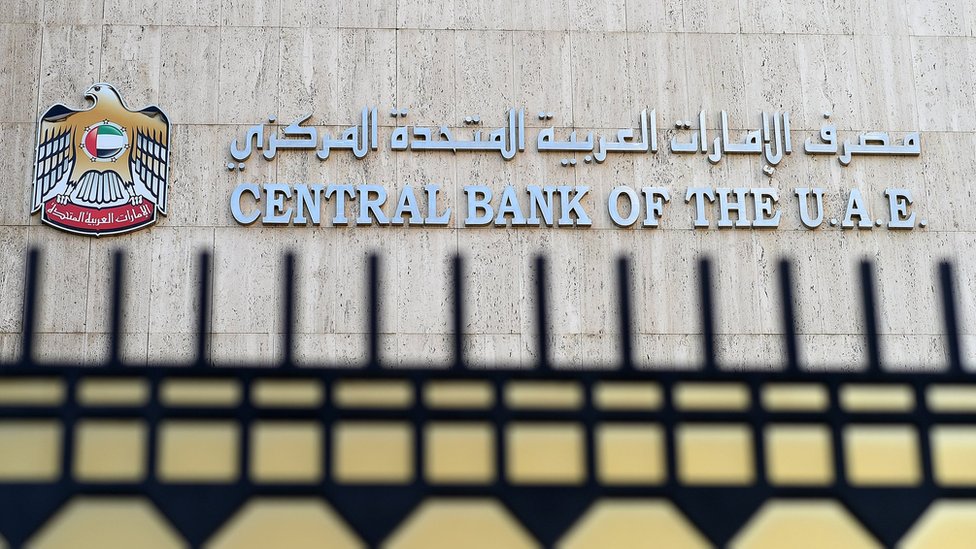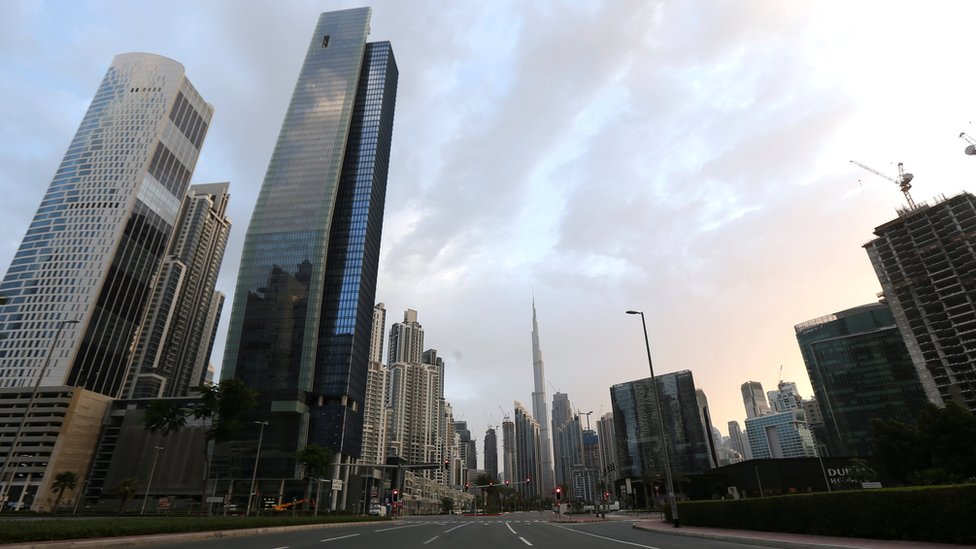By Ahmed Elshamy & Owen Pinnell
BBC News Arabic

The United Arab Emirates' central bank failed to act on warnings about a local firm which was helping Iran to evade sanctions, the BBC has found.
Leaked documents show Dubai-based Gunes General Trading processed $142m (£110m) in suspicious transactions through the UAE financial system in 2011 and 2012.
The activity was flagged by a British bank, but the firm was able to continue using local financial institutions.
In 2016, the US said it was involved in a major sanctions-busting scheme.
The Central Bank of the UAE did not respond to the BBC's request for comment.
Gunes General Trading has been wound up within the last two years. The BBC has been unable to reach anyone for comment.
The documents - known as the FinCEN Files - were leaked to BuzzFeed News, then shared with the International Consortium of Investigative Journalists (ICIJ) and BBC News Arabic.
What sanctions were being evaded?
The US first imposed sanctions on Iran during the 1979-1981 Tehran hostage crisis.
Since then, successive US administrations have introduced measures intended to compel Iran to change its behaviour, such as limiting its nuclear programme. One of these measures was to cut off Iranian banks from the global banking system used to make payments in dollars in 2012.

There were no further concerns raised about the company's activities following Zarrab's arrest in the US.
In 2017, Zarrab pleaded guilty to fraud, conspiracy and money laundering charges. He is yet to be sentenced.
What do the documents show?
Banks based in the UAE rely on big US-based banks to monitor and approve their US dollar payments - a service known as "correspondent banking".
Among the FinCEN files is an SAR that shows the New York branch of UK-based Standard Chartered Bank contacted the Central Bank of the UAE in 2012 after noticing hundreds of suspicious transactions by Gunes General Trading. The reports did not say any of this activity was linked to sanctions evasion by Iran.
SARs are a way to alert government regulators and law enforcement to irregular activity that should be investigated, although they are not necessarily evidence of wrongdoing.
The central bank told Standard Chartered that "the case has been passed on to law enforcement authorities" and that "accounts were closed in September 2011".
But Standard Chartered flagged that the company was able to "continue its suspicious activity" by "utilizing various accounts that [it] maintains with other banks".
In fact, the central bank failed to stop Gunes General Trading using two other accounts with two UAE state-owned banks - Rakbank, the national bank of the northern emirate Ras al-Khaimah, and the National Bank of Dubai (NBD).

The FinCEN files show Gunes General Trading was able to process a further $108m of transactions flagged as suspicious until September 2012, the majority of them through Rakbank.
Rakbank said that because of confidentiality it does not comment on specific transactions but it complies with anti-money laundering and sanctions regulations and has strict policies in place to monitor this.
NBD did not respond to the BBC's request for comment.
In April 2013, the US Bank of New York Mellon filed a SAR saying that following a US government inquiry into Gunes General Trading, it believed the company was conducting transactions in a manner designed to evade sanctions against Iran.
"Government authorities must both investigate alleged cases of financial crime and protect the integrity of the financial system," said Tom Keatinge, director of the centre for financial crime and security studies at the Royal United Services Institute (Rusi).
"This case brings into question the extent to which the UAE Central Bank took the second part of this responsibility seriously. Criminal actors thrive as a result of failures to share information, and this appears to be a prime example of such a failing."

The FinCen Files is a leak of secret documents which reveal how major banks have allowed dirty money to be moved around the world. They also show how the UK is often the weak link in the financial system and how London is awash with Russian cash.
The files were obtained by BuzzFeed News which shared them with the International Consortium of Investigative Journalists (ICIJ) and 400 journalists around the world. Panorama has led research for the BBC.
FinCEN Files: full coverage; follow reaction on Twitter using #FinCENFiles; in the BBC News app, follow the tag "FinCEN Files"

Related Topics
- Money laundering
- United Arab Emirates
- Iran
- Iran sanctions
- Banking
tinyurlis.gdclck.ruulvis.netshrtco.de
مقالات مشابه
- شرکت صادرات و واردات کالاهای مختلف از جمله کاشی و سرامیک و ارائه دهنده خدمات ترانزیت و بارگیری دریایی و ریلی و ترخیص کالا برای کشورهای مختلف از جمله روسیه و کشورهای حوزه cis و سایر نقاط جهان - بازرگانی علی قانعی
- Coronavirus: ما بیماری رئیس Dr Anthony Fauci تماس کاخ سفید حملات 'عجیب و غریب
- آموزش بورس - امیدینو.ترید
- آخرین اخبار «رنت ماشین
- شرکت صادرات و واردات کالاهای مختلف از جمله کاشی و سرامیک و ارائه دهنده خدمات ترانزیت و بارگیری دریایی و ریلی و ترخیص کالا برای کشورهای مختلف از جمله روسیه و کشورهای حوزه cis و سایر نقاط جهان - بازرگانی علی قانعی
- Coronavirus: 10 die drinking sanitiser after Indian state shuts liquor shops
- ترفند های خانه داری و زندگی - تاپ ترین ترفند ها
- نگرانی پلیس صدمات سر
- شرکت صادرات و واردات کالاهای مختلف از جمله کاشی و سرامیک و ارائه دهنده خدمات ترانزیت و بارگیری دریایی و ریلی و ترخیص کالا برای کشورهای مختلف از جمله روسیه و کشورهای حوزه cis و سایر نقاط جهان - بازرگانی علی قانعی
- بایدن در حالی که تحت کولونوسکوپی قرار می گرفت، قدرت را به کامالا هریس سپرد